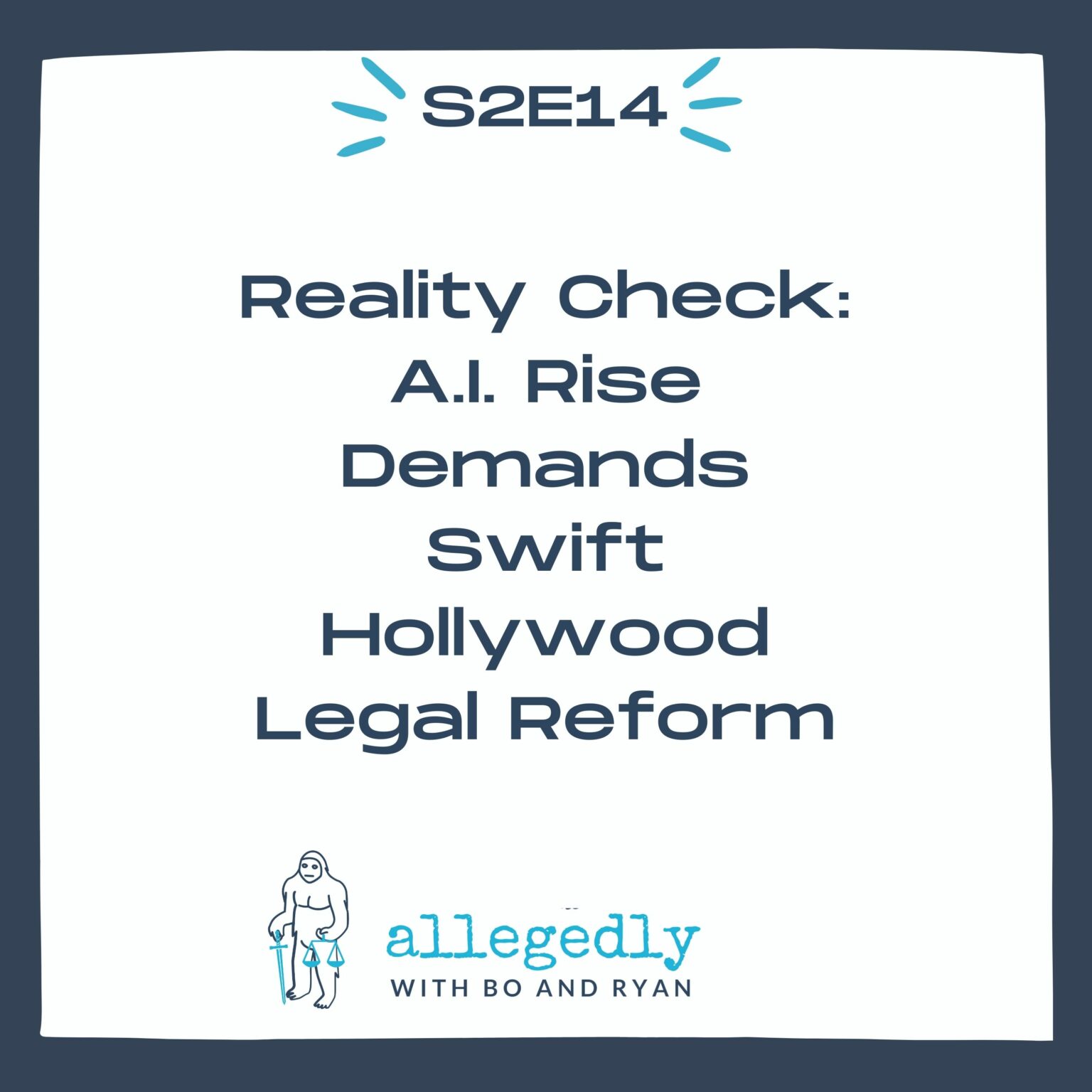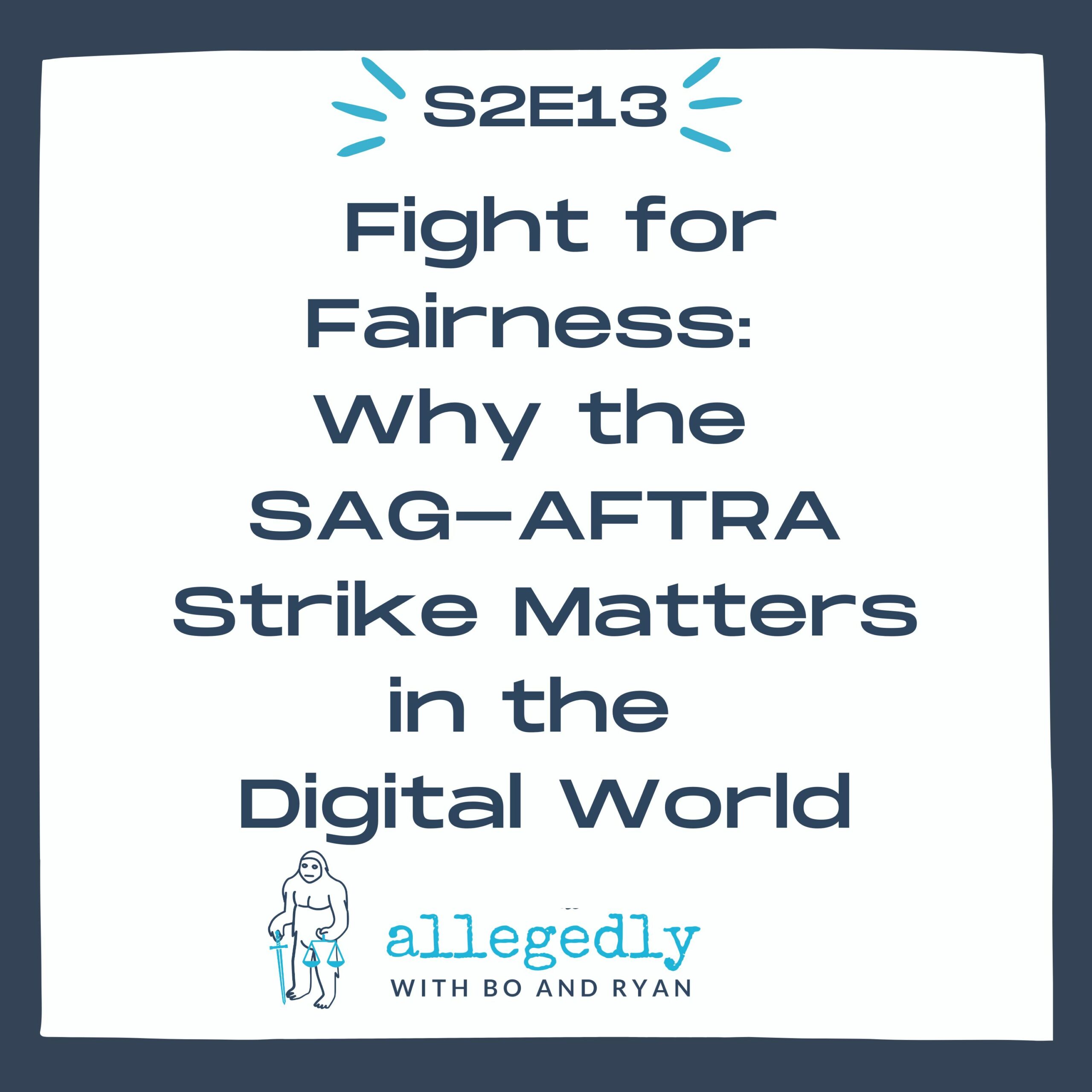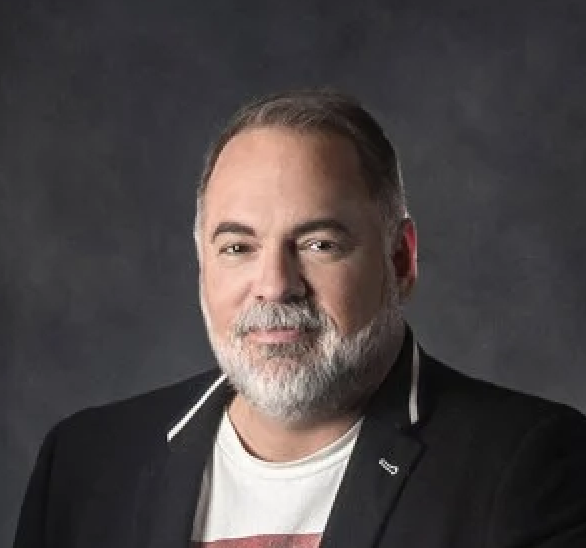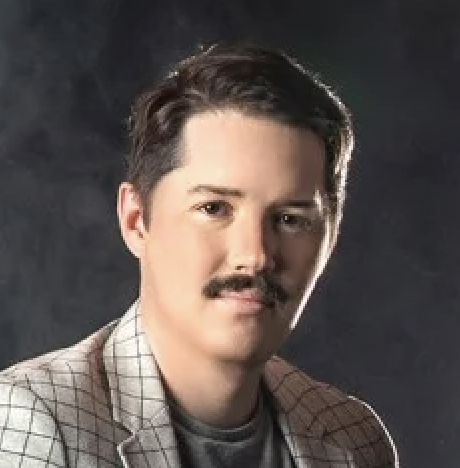allegedly with Bo and Ryan | Season 2 Episode 6
Allegedly… with Bo and Ryan Podcast S2E6| Transcript
Ryan: [00:00:00] I’m going to let the listeners in on a little secret. If you happen to be in court and don’t like the judge’s decisions, trying to turn around and arrest the judge is a very bad idea.
Bo: [00:00:09] Agreed.
Ryan: [00:00:10] Welcome to Allegedly with Bo and Ryan, the only entertainment and law podcast that brings you the truth, the whole truth, and nothing but the truth… Allegedly.
Bo: [00:00:21] I’m Bo Bowen.
Ryan: [00:00:22] And I’m Ryan Schmidt.
Bo: [00:00:23] You’re listening to Allegedly with Bo and Ryan. We’re coming to you from our law offices in beautiful, historic Savannah, Georgia, where we’ll be chatting about pop culture, hot legal topics in the news, and doing our best to change the way people think about the law and lawyers.
Ryan: [00:00:39] But first, a little about us. Bo doesn’t need a passport. He just walks into any country he wants and says, I’m Bo. And then they give him a high five.
Bo: [00:00:47] And Ryan once played Russian roulette with a fully loaded gun and won.
Ryan: [00:00:54] Together, we are Savannah’s consummate renegade legal titans.
Bo: [00:00:58] And the only corporate entertainment lawyers in the free world who have never lost a single case…
Ryan: [00:01:04] Allegedly.
Bo: [00:01:05] Welcome to season two, episode six of Allegedly with Bo and Ryan.
Ryan: [00:01:12] Wow, We’re on a roll. And they said it wouldn’t last. Well, you’re always asking me about myself. What’s new in Bo’s world?
Bo: [00:01:20] Well, I had an interesting night last night. My youngest daughter, who is graduating from Savannah Arts, she took part in the Savannah Arts fashion show last night. She was actually the very first model that walked out to start the show last night.
Ryan: [00:01:39] So. Wow, that’s an honor.
Bo: [00:01:40] Well, that was it was an it’s one of those interesting experiences as a parent where you’re like, on the one hand, you’re so proud of your child and on the other hand, you’re like, oh, my God, cover her up immediately. But yeah, I’m really proud of her. I’m very excited because she just recently got accepted to UGA.
Ryan: [00:02:04] Congratulations,
Bo: [00:02:04] She’s graduating next month and then we’ll be headed up to Athens in August. So when you see that I’m a complete emotional wreck in August, you’ll know exactly why.
Ryan: [00:02:18] Yeah, fair enough. You were telling me a pretty funny story about when you toured UGA and you said you were at the stadium and you kind of pulled a prank on the people that were doing the tour.
Bo: [00:02:30] Oh, yeah. You know, of course, that was right after Georgia had won their second straight national championship and we were touring and they said, and this is Sanford Stadium, and looked at them very seriously and was like, “Oh, wait, Georgia has a football team?” Then like the look of horror on this young girl’s face. As if anyone in the in the universe could not know that the Georgia Bulldogs had a football team was priceless.
Ryan: [00:02:58] Oh, that’s amazing. Yeah, that’s got to be a big draw for that school, huh?
Bo: [00:03:01] Yeah, absolutely.
Ryan: [00:03:03] Well, I know we had so much fun in Season two, Episode two, where we’re talking about the frivolous lawsuits, right?
Bo: [00:03:10] Oh, yeah, absolutely.
Ryan: [00:03:11] I thought it’d be fun if we talked about some of the wackiest lawsuits that film and television creators have been hit with over the years. You know, there’s always these crazy things. Movies come out, TV shows come out, and there’s there’s these lawsuits. Whether it’s from the man who inspired the movie Titanic to a person who sued a studio because the movie trailer looked better than the actual movie, there’s plenty to choose from.
Bo: [00:03:33] Oh, there’s been a ton of them. So this was a kind of a fun list to put together. So do you mind if I start? Can I go first?
Ryan: [00:03:41] Be my guest.
Bo: [00:03:41] Well, the first dispute that came to mind for me was absolutely Charlie Sheen versus the creators of Two and a Half Men.
Ryan: [00:03:52] Yes.
Bo: [00:03:52] Now, Ryan, if you know anything about me, you know I love a story that involves a celebrity completely losing their mind. [Laughter] So about ten years ago, Charlie Sheen definitely had one of those moments.
Ryan: [00:04:10] Oh, big time. Yeah. He had the “Britney shave the head” moment for sure.
Bo: [00:04:13] You know, there’s a writer I like named Bill Simmons. He goes by “The Sports Guy.” He used to write for ESPN and now he has his own website called The Ringer. Well, Bill created something that he calls the “Tyson Zone,” and it’s obviously named after the ubiquitous Mike Tyson. And the Tyson Zone refers to any time a celebrity has engaged in such wild behavior that no matter what story you heard about them, you would absolutely believe it’s true.
Ryan: [00:04:45] I love that.
Bo: [00:04:47] And of course, that was absolutely the case with Mike Tyson back in the days of the face tattoo and the “I’ll eat your children” and you know, all that …
Ryan: [00:04:54] Pet tigers.
Bo: [00:04:55] Yeah, all that wild stuff. So it is a rarefied air to enter the Tyson Zone. Okay. I mean, it has to be a person that if, a friend of yours just said to you, ‘Hey, did you hear that so-and-so just urinated on a police officer or just began breeding unicorns?’ You’d be like, ‘oh, yeah, I believe that. Absolutely’. You know, ‘that sounds right.’ So I can think of a few people over the years that spring to mind when I think of the Tyson Zone. Okay. Okay. I mean, you’ve got, you know, Michael Jackson back in the day, you know, Courtney Love, Dennis Rodman, R Kelly. There was a time with like Tara Reid, Andy Dick. You know, Gary Busey.
Ryan: [00:05:43] Oh sure
Bo: [00:05:43] I mean, you kind of see the pattern here, right?
Ryan: [00:05:46] Shia LaBeouf has entered that one, too.
Bo: [00:05:48] There was certainly a time, probably when he was here at Savannah, and I think more recently, you could definitely add Donald Trump or Kanye West to that list.
Ryan: [00:05:59] Oh Definitely, for sure.
Bo: [00:06:01] But back in around 2011, there was definitely a time when the Tyson Zone could have absolutely been renamed the Sheen Zone.
Bo: [00:06:13] So let me set the stage. 2011, Charlie Sheen finds himself embroiled in a legal battle with the producers of his hit show “Two and a Half Men.” Now, Ryan, it is hard to describe how incredibly popular “Two and a Half Men” was back at that time. It was literally the number one show on television for six years in a row. It was crazy.
Ryan: [00:06:41] Wow.
Bo: [00:06:42] And a lot of people credit it for single handedly keeping the sitcom format alive. That’s how influential it was. And it was right at the height of this popularity that Charlie Sheen lost his damn mind. Okay. So, the trouble really started when Sheen made a series of very nasty comments about the show’s creator, Chuck Lorre. He did it in various interviews and on social media. I mean, let’s just say Sheen’s Twitter fingers were pretty damn active back at this time.
Ryan: [00:07:19] Oh, for sure.
Bo: [00:07:20] I mean, he, among other things, called his boss, you know, a clown and a maggot. And then he starts referring to himself as a warlock. And like a you know, I’m a rock star from Mars. And, of course, he famously would end every interview by saying “winning.”
Bo: [00:07:40] It was just insane, and it really got bad when he started making some pretty controversial comments about his own rampant drug use, which he said was not a problem and he could handle it because he had, quote, “Tiger blood and Adonis DNA.”
Ryan: [00:08:01] Well, 2011, Charlie Sheen was easily the most powerful breed of Charlie Sheen. Right? I mean, I’m pretty sure at that time he said he was like the highest paid actor in Hollywood for TV shows.
Bo: [00:08:12] Yeah. Yeah. Making about $2 million an episode, which gave him, of course, 2 million reasons not to bite the hand that fed him as it was crazy. So, to the surprise of no one, these comments about Lorre did not sit well with the show’s producers, who promptly and immediately fired Charlie Sheen from the most popular show on television. It was crazy. I mean, it was very rare that something like that happens. So as a result, Sheen’s character was kind of unceremoniously killed off on screen. And Ashton Kutcher was brought in to round out the cast. Did not go as well from that point moving forward. It did okay, but it obviously never reached the heights of popularity that it did with Sheen.
Ryan: [00:09:03] Oh, for sure.
Bo: [00:09:03] Well, Sheen responds by suing the producers for breach of contract and seeks $100 million in damages. The studio kind of, you know, kind of entertainingly claimed that they fired him out of respect for Charlie Sheen. They were hoping that, you know, he would really use this time off to seek some help. IT was pretty nasty and condescending, but, understandable at the same time.
Ryan: [00:09:36] Right.
Bo: [00:09:37] So, Well, the battle ultimately did not play out in court because the case ultimately settled for an undisclosed amount.
Ryan: [00:09:46] I’m guessing there was a lot of zeros on that settlement.
Bo: [00:09:49] Well, I’m pretty sure that’s a safe bet. But, you know, you know, in reality, Charlie Sheen’s behavior and his comments and stuff, that cost him a whole lot more than his job on Two and a Half Men. I mean, if you go back, Charlie Sheen was actually a very well respected actor. Remember, he was in Platoon. He came from, I mean he was Martin Sheen’s son, so he was from a very well respected family. But he damaged his reputation and his career, maybe irreparably. I mean, certainly horribly. And he’s never really recovered from that. I mean, but look, he still got his tiger blood.
Ryan: [00:10:32] That’s right. Well, no one can take that away from him, at least you know.
Bo: [00:10:36] Fair enough.
Ryan: [00:10:37] Okay. Well, I got one. All right, let’s let’s. Let’s play a little game. All right. I want you to imagine that the year is 1997, okay? You’ve just come home from Blockbuster and you fired up Titanic on the old VCR. You know, maybe you had to blow into it, just make sure it worked and everything, but you fired it up and people seem to like it. So you think you’re in for a pretty sick night? You know,
Bo: [00:10:59] 100%.
Ryan: [00:11:00] Right? It’s going to be a good one. Well, think again. And this is VCR, so I’m pretty sure Titanic came in at least two different videos because it was like a 3.5 hour movie.
Bo: [00:11:13] True.
Ryan: [00:11:14] Well, as soon as you see Leo on screen, it all goes to s**t. You are convinced that the movie creators have stolen your likeness and life story for profit. And you must sue.
Bo: [00:11:27] Are you being for real?
Ryan: [00:11:28] This is. This is very real. Except imagine now it’s 1997. You watch this movie, you want to sue them, and now you just do nothing for 20 years.
Bo: [00:11:39] That’s an interesting tactic.
Ryan: [00:11:41] You wait for the 20th anniversary of Titanic to come out on special Blu ray DVD, and you file a lawsuit against, not only James Cameron, but all the creators of Titanic, claiming that the character Jack was based on you.
Bo: [00:11:57] Well, that would be an interesting choice to make legally.
Ryan: [00:12:02] Well, this is this case. So according to the plaintiff, the character Jack’s life was shockingly similar to his own experience working as a yachtmaster in Florida from 1988 to 1989.
Bo: [00:12:19] Yeah, sounds exact so far. [Laughter]
Ryan: [00:12:23] Right? We’re about 100 years difference, but it’s about the same. In his complaint, he alleged that Cameron could have heard these stories by word of mouth. He was talking about his exploits with women and being a yacht master. And it’s possible, because these stories were so good, that they got back to James.
Bo: [00:12:42] Well, I mean, in fairness, he may have been “the king of the world.”
Ryan: [00:12:46] Exactly. Well, he also claims in this lawsuit that the films used, not only used his life story without permission, but took the stories of his relatives who were allegedly aboard the Titanic when it capsized. And get this: his male relative died, his female relative survived.
Bo: [00:13:05] Okay.
Ryan: [00:13:06] But that part about his relatives was conveniently never supported by any evidence.
Bo: [00:13:12] Sounds legit so far.
Ryan: [00:13:15] Okay. For this trouble and for stealing his life story, he demanded $400 million in a percentage of all future profits. Now, we hate to burst this guy’s bubble, but we’re pretty sure that Jack Dawson wasn’t actually based on him. After all, Jack was a fictional character born in the 19th century, played by none other than Leonardo DiCaprio. But I have to give him some credit. You know, there are some striking similarities here. Both Jack and the plaintiff had blonde hair. They once traveled on a boat and both had romantic relationships.
Bo: [00:13:51] Well, I mean, that’s uncanny, really.
Ryan: [00:13:53] Well, in the end, the lawsuit was dismissed with the judge ruling that there was no evidence to support the claims. But we have to give him credit for trying and for reminding us all that sometimes we see ourselves in the most unexpected places.
Bo: [00:14:06] I have to say, after you told me about that, I had to go look up that case for myself. And it turns out the party didn’t stop there. Ryan.
Ryan: [00:14:15] Oh no.
Bo: [00:14:16] So after that case got dismissed in Florida, this dude immediately re files an identical lawsuit in California. The court in the second case didn’t like the case either, and obviously throws the case out. Plaintiff was not pleased, so he appeals and then tries to disqualify the judge. Okay. All right. That’s a strong tactic. You know, that’s kind of a nuclear option. But he didn’t just stop there. Okay. At the disqualification hearing, he then tries to make a citizen’s arrest in open court, going so far as to read the judge his Miranda rights.
Ryan: [00:14:58] Oh, my God.
Bo: [00:15:00] That case, to the surprise of literally no one, also got pitched out.
Ryan: [00:15:05] Wow. Well, I’m going to let the listeners in on a little secret. If you happen to be in court and don’t like the judge’s decisions, trying to turn around and arrest the judge is a very bad idea.
Bo: [00:15:16] Agreed.
Ryan: [00:15:17] You know the best part of it, though.
Bo: [00:15:19] Well, what’s that?
Ryan: [00:15:20] We now know what would have happened if the door was big enough to fit both Rose and Jack.
Bo: [00:15:24] Oh, you know, you’re absolutely right. He would have left Rose and become a yachtmaster in Florida. That was wild, man.
Bo: [00:15:33] All right, I got another one Ryan. I know you’re into cars. Anybody that listens to this podcast should know that by now. You’ve even been known to wear those fancy leather driving gloves.
Ryan: [00:15:47] Guilty.
Bo: [00:15:49] Now, here’s my question.
Ryan: [00:15:50] Okay.
Bo: [00:15:51] How much of the decision to wear these fancy leather driving gloves was based on how cool Ryan Gosling looked wearing them in the 2011 movie Drive?
Ryan: [00:16:04] Oh, like 90%.
Bo: [00:16:06] That’s that’s kind of what I figured. So then you’re going to really like this next one? Okay.
Bo: [00:16:11] It looks like the creators of Drive really drove some people crazy. You see what I did there?
Ryan: [00:16:19] I Saw that. Nice.
Bo: [00:16:21] So in 2012, a class action lawsuit got filed against the producers of Drive, claiming they had misled audiences into thinking the movie was a high octane action flick, when in fact it was a more slow burning arthouse film.
Ryan: [00:16:41] Yeah, liked it.
Bo: [00:16:44] According to this lawsuit, the movie’s marketing had featured images of fast cars, intense chase scenes, and, you know, Ryan Gosling looking all brooding and cool. But in reality, they said, you know, the film was more of a character study with long stretches of silence and introspection. I mean, really, how dare they? Just a few short months after the case was filed, a judge in Michigan dismissed this proposed class action. I mean, he rules there’s no misrepresentations of material fact. The plaintiff–you see a little theme here–accuses the judge of being anti-Semitic and tries to have him removed from the case. You know, I mean, again, not the best strategy.
Ryan: [00:17:35] No, not at all.
Bo: [00:17:38] The matter was taken to a Michigan appeals court, which concluded, you know, that the movie trailer did not make any inaccurate representations and that the original plaintiff had failed to produce any evidence to support these claims. Well, despite these rulings, despite one setback after another, the case continued with the plaintiff filing a new case, an identical case in federal court in 2017. She represented herself…
Ryan: [00:18:05] Oh man,
Bo: [00:18:05] She expanded the list of defendants to include the director of Drive, Nicolas Refn and actor, Albert Brooks. Also Sony, Netflix, Amazon, Apple, Google, AMC. I mean, just listed everyone based on an alleged conspiracy involving all these defendants to defraud her of her movie ticket price.
Ryan: [00:18:30] Which couldn’t have been more than like 20 bucks.
Bo: [00:18:32] Exactly. And again, the case was unceremoniously dismissed. Now, I’m not sure about you, Mr. Schmidt, but I’m pretty sure that anybody that went to the movie Drive just because they thought it was going to be Fast and Furious with a side of Gosling probably deserved a little disappointment. But look, I’m not here to judge.
Ryan: [00:18:57] I definitely thought that that was what that movie was going to be.
Bo: [00:18:59] In the end, of course, all the Drive lawsuits get dismissed. Judges rule the movie’s marketing had not been deceptive. But we have to admit, you know, it’s pretty funny to imagine a bunch of angry moviegoers storming out of the theater demanding their money back because they were expecting Fast and Furious Six, Gosling’s Revenge.
Ryan: [00:19:24] Forget the haters. You know that movie was great. And I think it even got something like 90 plus points on Rotten Tomatoes.
Bo: [00:19:30] Well, obviously we all know Rotten Tomatoes is infallible.
Ryan: [00:19:34] Of course. Well, okay. Keep them moving. I got I’ve got one. I’ve got a confession to make. I hate when companies try to be cute by misspelling things.
Bo: [00:19:45] Oh, Like Chick-fil-A?
Ryan: [00:19:46] Yeah, exactly. Like great sandwiches, terrible name. Hate it. Well, the next case involves a musical group called the Weird Sisters, spelled ‘W-Y-R-D.’.
Bo: [00:19:59] Gross.
Ryan: [00:20:00] Yeah, that’s that’s my thought, too. Well, the band decided to sue the creators of Harry Potter and the Goblet of Fire for copyright infringement. Well, what was their beef with Harry Potter, you ask? The Weird Sisters claim that the film’s portrayal of a band of singing witches at the Hogwarts School of Witchcraft Ball was a blatant rip off of their own band’s name and image.
Bo: [00:20:24] Oh, boy.
Ryan: [00:20:25] Now we don’t want to cast any aspersions here, but it’s hard to deny the similarities. Both the film and the band actually featured witches singing and performing on stage, and both were named The Weird Sisters. Plus the real life Wyrd Sisters actually taken all the proper steps in obtaining a trademark for their name. But they don’t sue under trademark infringement. They sue instead on copyright infringement.
Bo: [00:20:50] Well, they probably if they had done trademark, they probably would have had a decent case.
Ryan: [00:20:53] It wasn’t a bad case. In the end, the lawsuit gets dismissed with a judge ruling that the band failed to allege a valid copyright claim. We have to give the Weird Sisters credit for standing up for their name and image and for reminding us all: In a world of entertainment law, you never know what kind of magic you just might encounter.
Bo: [00:21:12] Oh, my God. Did you really just say that?
Ryan: [00:21:15] Absolutely.
Bo: [00:21:16] All right. Well, do we have time for one more?
Ryan: [00:21:19] Absolutely.
Bo: [00:21:19] All right. Well, I might have one even weirder than those cases.
Ryan: [00:21:24] Weirder than the Wyrd Sisters?
Bo: [00:21:27] Let’s just say this was a pretty shagadelic case baby involving none other than the Austin Powers franchise.
Ryan: [00:21:36] Oh, behave.
Bo: [00:21:39] Now, before I begin, let me first issue a public apology for using the word shagadelic, because that sounds about as natural and comfortable coming out of my mouth as me using the word bootylicious.
Ryan: [00:21:54] And yet they both sound so good.
Bo: [00:21:57] So, back to the law. In the late 90s, a man sued the producer of the Austin Powers movies, claiming that the character of Dr. Evil was clearly based upon him.
Ryan: [00:22:14] Oh, my God.
Bo: [00:22:15] So, yes, you heard that right. Apparently, this man believed he was the real life inspiration for the bald-cat loving villain. He even claimed that, like Dr. Evil, he had a hairless cat who was named Señor Buttersmith.
Ryan: [00:22:37] There’s no way this is real. Señor Butter Smith. Really? That is way too close to Mr. Bigglesworth.
Bo: [00:22:44] Hey, I don’t make the law. I just interpret and uphold it like any old average, modern day legal superhero. Okay. But look, looking at that case, I mean, honestly, there were a few similarities. But let’s face it. Dr. Evil’s signature look, you know, the bald head, the pinky finger, the Nehru jacket, you know, that was already kind of a cultural phenomenon by the time Austin Powers had hit the screen.
Ryan: [00:23:09] Oh, for sure.
Bo: [00:23:10] So I have a feeling that this guy’s claims were about as convincing as Mike Myers attempts at seduction, or Ryan Gosling’s attempts to be as cool as Ryan Schmidt, you know, that kind of thing.
Ryan: [00:23:24] Wow, I’m honored.
Bo: [00:23:24] So in the end, the lawsuit is thrown out and the plaintiff was left to ponder the age old question: why couldn’t I have been the inspiration for something cooler, like maybe James Bond?
Ryan: [00:23:37] You mean kind of like how every client immediately becomes cooler when they team up with The Bowen Law Group?
Bo: [00:23:42] Exactly, Ryan. Which is why we are the most successful lawyers in the history of human jurisprudence… Allegedly.
Ryan: [00:23:50] Well, that’s our show for today. Thanks for listening to the legal mastery of the highly intelligent and easily most attractive, true legal out-lawyers in Savannah. And remember the only lawyers in the free world who have never lost a single case…
Bo: [00:24:01] Allegedly.
Ryan: [00:24:02] To continue to receive free edge-of-your-seat legal anecdotes, mind blowing takes on hot topics, a general masterclass in law-someness, please head over to bowenschmidt.com/podcast.
Bo: [00:24:11] And look dude, if you don’t tell people to just hit subscribe, I’m entering the Tyson Zone.














